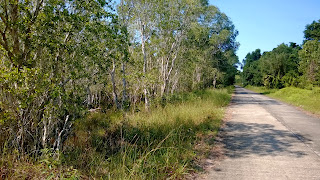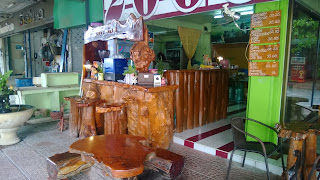We were living at a Buddhist monastery and so we lived by the eight precepts of the Dahmma, or moral guidelines in Buddhism:
-Do no take away any breath (all vegetarian meals, and no killing mosquitoes or bugs!)
-Do not take what is not given
-Refrain from sexual activity (The men and women were separated in every group activity, the room was divided in half for the dinning hall, the meditation hall, and we lived in separate dorms)
-Refrain from harmful or incorrect speech (We were silent)
-Refrain from taking intoxicating drinks or drugs (Including caffeine)
-Refrain from eating after noon
-Refrain from dancing, singing, music, seeing entertainment, and wearing jewelry, perfume, and cosmetics.
-Refrain from using luxurious beds or pillows
We were also asked not to read books, write in journals, or use a cell phone or camera. So! No sex, no drugs, no rock and roll, and no consumerism. haha this may sound a bit extreme, and it really felt that way at times - I was calling the whole thing 'Meditation Bootcamp' by day 2. Living in such simplicity actually came relatively easy to me -- One gratifying thing I realized in myself is that I'm pretty adaptable to a wide range of circumstances and environments.
The second most difficult part of the retreat was adjusting my body to sitting, unsupported, for so many hours every day. My back, butt, and legs were aching even in the last days of the retreat. The first most difficult part was taking my mind through the 10 day journey.
Practicing Meditation
Being successful in meditation comes much more easily in a peaceful, non-stimulating environment, which the conditions of the retreat set up quite thoroughly. In our day to day life, we're absolutely immersed in stimulus in everything! Our minds are constantly racing from sights, images of advertisements, planning our schedules, multitasking between electronics and conversation, eating flavorful/stimulating food (often synthetically made to be flavorful and stimulating), new ideas, remembering past events, looking towards future events, watching tv, and etc. The list is endless, and so is the capability of the mind to wander and chatter through thoughts and anything it can conjure up. So, the first challenge to face, and continuously face, in meditation is attempting to quiet and focus the mind. We did this through a practice called Anapanasati, or mindfulness with breathing. Practicing mindfulness means to focus as thoroughly and diligently as possible on the task at hand. When you mindfully breathe, you're putting all of your attention on the breath, watching it travel "from nose-tip to nasal." Breathing in a long, slow manner relaxes both the body and the mind - after you breath and meditate for an extended period of time, you notice the influence of the breath in this way. This was the major method of meditation we focused on throughout the retreat!
Mindfulness was really the name of the game, the theme of the week, and a major insight into living. You could also call it "being here now" or "staying in the present moment." We were challenged to mindfully eat our food, acknowledging its purpose to feed our body and stay healthy (rather than have a tasty mouth party as we normally might seek with flavor --needless to say the food was pretty good, but also pretty bland haha). We did our daily chores mindfully (I chose to rake sand and leaves underneath "the Big Tree" as seen in the photo below). Mindfully walk, bathe, brush our teeth, and etc.
So what does all of this effort amount to?! When you pay attention to what you're doing in mindfulness, you are more observant of your actions, your words, and your thoughts. You have better insight into what you're doing, making you more capable to make wiser decisions and cause less negative impact. You also have better insight into why you're doing something, meaning you're more in tune with your emotions and rational. In addition to this, you're in a more peaceful state of mind (When you're washing the dishes, you're not stressing out about making it to that meeting in the afternoon, or worrying if you said the right thing in a conversation you had the other day. You're simply washing the dishes.) You slow down and focus on the task at hand, because our mind can only focus on one thing at a time. (When we try to have a conversation with someone and our mind is somewhere else, or we're texting/watching tv, we are only taking snipets of what the person is saying, then piecing together what we think their message is. So, you can see how things like this can lead to ineffective communication and confusion.)
You probably realize that much of this is easier said than done because our lives and societal pressures are constantly telling us to go faster, gain more status, more money, and indulge more into our most immediate desires, which are typically not the wisest decisions. We've grown up with many values and live them out every day, so beginning to deconstruct them is a big project (which helps explain the severe simplicity of the meditation retreat).
These are a summary of some of the major golden nuggets of knowledge I gained over the course of the retreat. Some of this stuff I've heard before, but it was really valuable to sit down and do it for myself, to know it for myself. The retreat was one of the most challenging, fascinating, and peaceful experiences I've had in my life. I hope to and plan on meditating on a regular basis. I've gained a new understanding, but have not undergone a dramatic change, and it will be difficult to sustain these ideals as I continue to adjust back to 'the real world,' especially when I get back to the busy schedule of school.
The elder monk at Suan Mokkh, Ajan Po said, mediation is not about gaining something you want or finding something you desire. It's about letting go.
Let go of emotions, judgements, opinions, and most importantly the ego. Detach yourself from 'the self,' the desire to gain more, the possessions you cling to (the possessions that may actually possess you! haha).
I would highly recommend anyone to consider this retreat. Although, if you think it may not be right for you, there are many other ways to practice meditation. If you are considering going to this retreat, I'm more than happy talk about it! But keep in mind that what I've written here is my own experience (it was different than every other person who also did the retreat) and it's best to enter a meditation retreat without expectations.
Alrighty, that's enough meditation life philosophy for now - keep in mind that all of this is pretty raw and I'm currently writing all of these thoughts in an internet-gamer cafe in Thailand.
And now a few anecdotes!
Thank you for bearing with this blog to this point! whew, it's a long one, but the funny thing about a silent meditation retreat is that as soon as the silence is broken, all you want to do is talk -or share your thoughts on the internet haha. Here are some highlights and unique moments that occurred over the retreat. :)
- We were constantly exposed to the environment and its creatures as every room and setting was either outdoors or open-air. So we got a lot of loving-kindness practice for things like ants and mosquitoes, which crawled on you or bit you on a daily basis (remember, we weren't supposed to kill any of these bugs! ah!). One morning on Day 5 I woke up to the bell at 4am, turned on my light and found hundreds of black ants swarming my toiletry bag at the foot of my bed! I was very startled, silently, and with a lot of breathing and courage swept the ants out of my room with my bandanna. They were attracted to the little bit of sugar in a melted cough drop in my bag. good grief.
- Each morning we watched the dark of night transition to dawn, and after daily yoga we had a few minutes to observe the landscape and the sun rising. Day 6 was an especially peaceful dawn, and as I watched one of the ponds I saw a giant lizard emerge from the water and slowly walk across the dew covered lawn. It was a beautiful moment I experienced alone, without a camera, and without being able to tell anyone.The lizard, I learned later a monitor lizard, was enormous!
- Another creature interaction occurred on Day 6 as I was practicing walking mediation along a path and about 10ft ahead of me I noticed a snake slowly slithering in my direction in the grass. My first thoughts were "Woa! How great." You may know that my family and I have had several pet snakes, so I think they're very cool creatures haha. Just a second later the wind picked up from my right, and the snake immediately reacted, lifting its head in the direction of my left, and unfurling a hood on either side of its head & neck. "WOA. OKAY. THAT'S A WILD COBRA." Luckily I had just come from a state of deep breathing, and slowly took a couple big steps back and watched the cobra slither away into some shrubs --it wasn't reacting to me which was a relief. Once again I silently kept the experience to myself haha...
- One of the coolest ongoing aspects of the retreats was being totally immersed in learning and understanding Buddhism. We were living at a monastery, living like monks and nuns, and every day we received a lecture from at least one of three different monks-- one of whom was the revered head of the monastery, 81 year old Ajahn Poh. It was fascinating to learn about Buddhism on a deeper level (there's a lot more substance to its doctrine than what some people brush off as "all life is suffering.") This was more meaningful as well because I was finally learning about the doctrine that shaped the history and identity of Thailand. Buddhism is much more a way of life than a religion. I was also learning a distinct perspective in Theravada Buddhism from the monk who founded Suan Mokkh, Buddhadasa Bhikkhu, who emphasized Anapanasati meditation and did not teach any faith in an afterlife or rebirth. In this light, Buddhism is not a religion in a strict sense because there's not a higher power or figure to have faith in; meditation is something that anyone can do. I loved hearing insights, stories, and even a sense of humor from the monks.
- Each morning at 4:30am we had a Morning Reading as read by a participant who volunteered for that day - it was usually an inspirational passage on mindfulness or mediation, written by a Buddhist. I enjoy reading passages out loud and so I figured I'd sign up eventually and ended up with day 11, the final morning. I got the reading on day 10 after breakfast and took it to my room to read through in advance. The cover page had a list of instructions, and as I removed this page from the top I read the words "Chief Seattle's Message." In one epic moment an enormous wave of emotions overwhelmed me as built up from the entire retreat and having been away from home already for so long: joy, nostalgia, homesickness, love, shock. I was totally stunned that out of all of the readings in the world, this was the one selected, and I happened to be the one, out of all the other nationalities represented at the retreat, to read it. The wave of feelings hit me even harder because of the total contrast to the peaceful, neutral non-feelings I had cultivated all week. Then ofcourse the reading itself was very powerful giving me descriptions of home as well as the tragedy of white dominion over people of color and their ignorant exploitation of the earth. The next morning I read the speech meaningfully and effectively. I had a profound feeling of being the right person, at the right place, at the right time. I felt as though all of my effort to this great task was what I was meant to do.
Photo Time
There aren't too many photos because the week was mostly an internal journey haha. And I also didn't have my camera until day 11 when I snapped a few pictures before I left. The retreat center was a really beautiful, peaceful setting (located near the town of Chaiya, north of Surat Thani, and directly east of the island Koh Samui). We were removed from the sounds and smells of the city and placed in a lovely, natural setting. |
| "The Big Tree" I raked the sand around the tree every day for my chore along with three other women. It was quite a nice, relaxing job, and such a cool tree to look at. |
 |
| One of the three ponds at the retreat. There is a walkway leading to an island in the middle of the pond which people often meditated on. |
 |
| The sign in the bathroom explaining how and why to rinse yourself with water after you use the toilet haha. It even gives some insight on impermanence - another prominent theme in Buddhism. |









































































































































